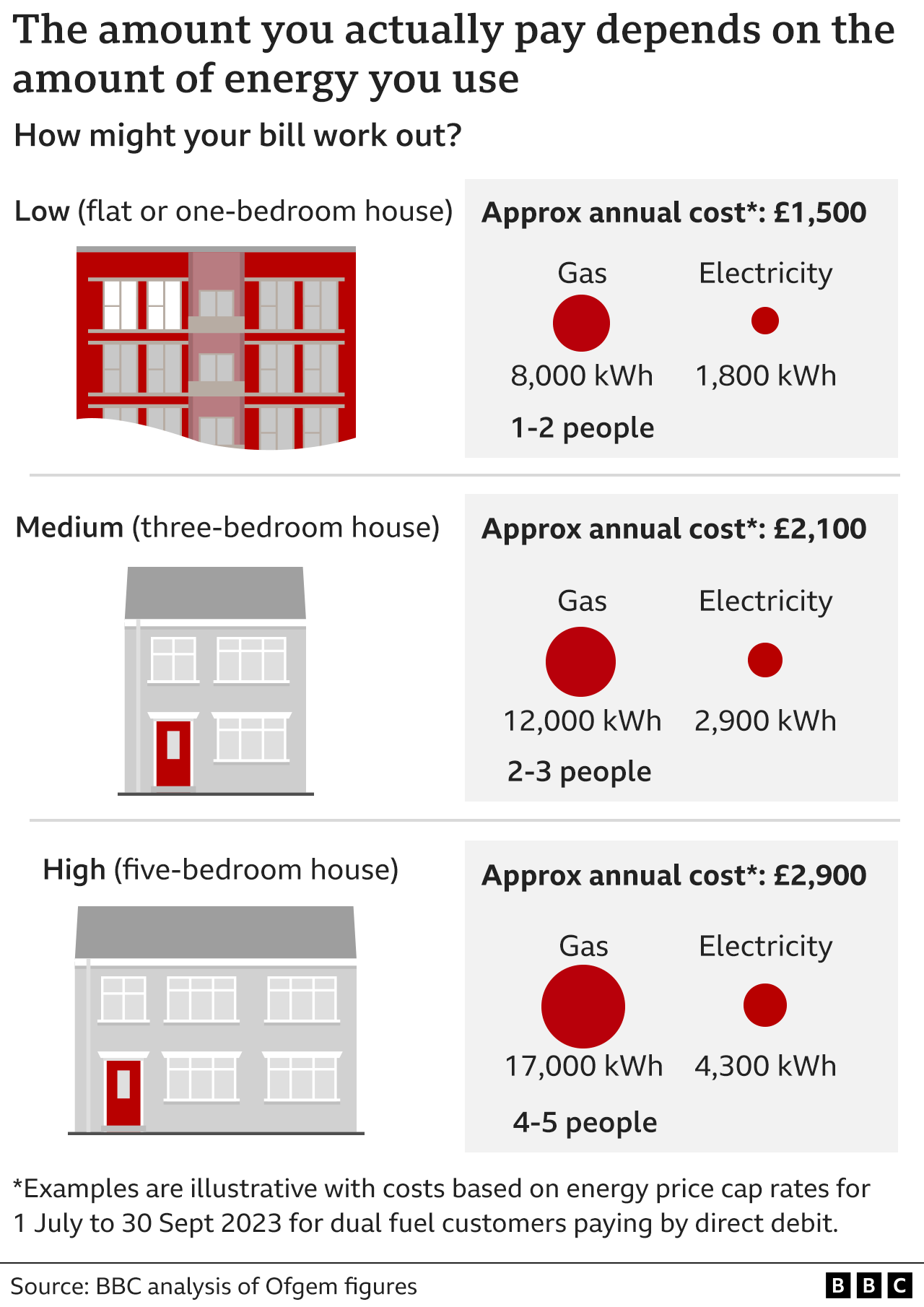Energy bills fall as new price cap comes into force
- Published

A change to the energy price cap has come into force, reducing domestic gas and electricity bills - with a further, smaller fall expected this winter.
A household in England, Wales and Scotland using a typical amount of energy will now pay £2,074 a year, a drop of £426 a year.
Analysts at the consultancy Cornwall Insight suggest the typical bill could fall to £2,000 a year this winter.
However, that remains much higher than the pre-pandemic norm.
Charities and suppliers have warned that even though prices are falling, there is a still a risk that many people with stretched finances will struggle to pay.
The actual amount paid by households will vary depending on the amount of gas and electricity they use.
On Friday, the chief executive of British Gas-owner Centrica, Chris O'Shea, said the "first act" of the energy crisis was over but risks remained.
Energy UK, which represents suppliers, said hundreds of extra staff had been hired by companies to ensure support is available.
Government support, which limited bills to £2,500 in recent months, is no longer needed. There are no plans for the £400 discount on all bills which the government funded last winter, although cost-of-living payments will continue to be made to those on low-incomes and receiving certain benefits,
How the cap is set
Wholesale energy prices and, in turn, the prices paid by customers have been high over the last 18 months.
Irrespective of government intervention, the energy regulator Ofgem sets a maximum price that suppliers can charge customers per unit of gas and electricity. It applies to households on variable or default tariffs in England, Wales and Scotland.
Under the new cap, which starts on Saturday and lasts for three months, the electricity unit rate is 30p per kWh, with a standing charge of 53p a day. The gas unit rate is 8p per kWh and the standing charge is 29p a day.
The calculations for a typical household are based on a direct debit customer using 12,000 kWh (kilowatt hours) of gas and 2,900 kWh of electricity a year. A kilowatt hour is a unit of energy used to calculate your bill.

Although prices are falling, not everyone will see an immediate change to their direct debits.
Energy UK said that suppliers were obliged to ensure the payments - which are smoothed over the year - are based on accurate and up-to-date information.
"Suppliers are on different cycles as to when they would assess a customer's amount, so some will have already been assessed. Customers should be reassured that when their direct debit is updated by their supplier, they will be contacted directly," a spokeswoman for Energy UK said.
Customers are being encouraged to submit meter readings to ensure their direct debit calculations are accurate.
About 29 million households are affected by the change in the cap, but there are some differences in typical payments. They include:
Those who pay via a prepayment meter will now pay a similar level to those on direct debits at £2,077 a year
Those who pay by cash, cheque or bank transfer, usually every three months, will now have to pay more, with a price cap leaving a typical bill at £2,211 a year
In Northern Ireland, which is regulated separately, bills are lower
People who were eligible for vouchers as part of the government's support package, but who failed to claim them, will now have missed out.
A deadline has passed to claim the vouchers, which were given to people who could not have the £400 government discount knocked off their bill last winter. They include people on some prepayment meters. Millions of pounds went unclaimed.
Charities say that there are still concerns over how people will cover their energy bills. National Energy Action, which lobbies for warm, dry homes, said that 6.6 million UK households would still be in fuel poverty and there was an "urgent case" for government help for them.
"Without more support too many will continue to rack up unmanageable debts or try and survive in unheated homes causing ill health, misery and avoidable death," said Adam Scorer, the charity's chief executive.
An Ofgem spokesperson said: "This remains one of the most difficult and volatile periods in history for energy consumers. And while bills remain higher than before the energy crisis, it is great news that people will see them drop."

Here are some energy saving ideas from environmental scientist Angela Terry, who set up One Home, a social enterprise that shares green, money-saving tips:
Get a water-efficient shower head free of charge from your water company and use showers rather than baths
Consider loft insulation, which she says costs around £460 for a typical semi-detached home and could save £355 a year on gas bills
Hang out washing instead of using a tumble dryer, and walk instead of drive when possible
Use windy days to feel where draughts are in the house. Wetting the back of your hand helps to locate them, then use insulation or draught-proofing tape
Where available, press the smaller button to use less water to flush the toilet

Related topics
- Published30 June 2023

- Published30 June 2023

- Published15 February 2024

- Published27 June 2024

- Published3 April 2024

- Published25 May 2023

